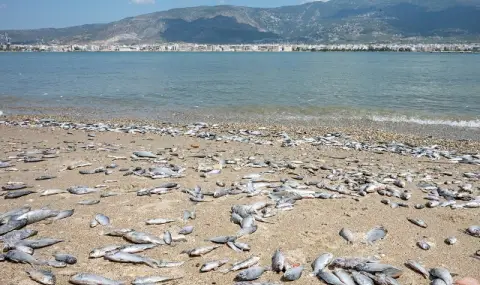After the incredible heat and fires, Greece is hit by a new misfortune. Tons of dead fish washed up off Volos. The disaster is also catastrophic for tourism, and the authorities know one thing – compensations instead of prevention.
After floods, heat, forest fires and water shortages on the Aegean islands, Greece is now experiencing a new disaster – over a hundred tons of dead freshwater fish washed up off the port city of Volos and into Pagasitikos Bay. Local authorities have declared a state of emergency until the end of September. The authorities in the city are now working hard to collect the dead fish.
Backstory
The fish washed ashore were from Lake Karla, about 20 km north of the port city of Volos, one of Greece's largest lakes. In 1962 it was drained to create farmland, but between 2010 and 2018 it was again partially renatured. After the floods in September 2023, its area in just a few days expanded to its original size of about 180 square kilometers. In the following months, the fish there multiply at a rapid pace.
But that year saw the hottest summer in the history of Greece. Not a drop of rain fell for months. As a result, the water level in the lake dropped very quickly and the fish suffocated. The initial information that they died entering the salty waters of the sea turned out to be false - the fish were already dead before the water carried them there.
The authorities did not react in time
This is the largest fish kill in the area, but not the first. The authorities should have followed the development of the situation in Lake Karla and monitored the condition of the fish. They should have promptly set nets in the river to collect and dispose of the dead fish. Instead, the fish falls into the sea.
Over a hundred tons of dead fish must now be collected from the port of Volos and nearby beaches. Local authorities use chartered trawlers and dredges. The fish are collected in containers and transported to a special installation in the nearby city of Larissa, where they can be burned. However, a huge amount of dead fish was mixed with sand, algae and rubbish. The city of Volos is currently looking for a location for the hazardous waste. It is being considered that it will be dumped in an abandoned quarry in the municipality of Rigas Ferraios, north of Volos. However, it is not yet clear what the impact on the local environment will be if huge masses of dead fish are stored there.
A huge problem for the tourism business
The footage of the tons of dead fish quickly went around the world. And the smell that wafted along the coast was unbearable for both local people and tourists. Many of them quickly left immediately after the disaster. This dealt a huge blow to the local economy, which relies heavily on tourism. The situation is very difficult for hoteliers and downright catastrophic for the famous fish restaurants of Volos. According to the Ministry of Health, there is no threat to public health. However, tourists are curious - hardly anyone wants to dine near the terrible sight.
According to the local chamber of commerce, commercial activity along the coast of Volos has dropped by about 80% in recent days. According to the representatives of the chamber, this is an "unbelievable ecological and economic catastrophe”. The government announced a number of measures to support the affected companies in the coming days. However, this is the usual reaction of the Greek governments after every disaster - instead of prevention, compensation is given. They often turn out to be worthless.
Who is to blame?
The search for those responsible for the disaster has already begun - even before the dead fish is collected. The mayor of Volos, Achilleas Beos, accused the regional governor of the Thessalian region, the port officials and the relevant ministries of not doing their job. “They didn't do the obvious - put safety nets in place,”, he said. The Supreme Court of Greece has launched an investigation.
In addition, authorities are awaiting the results of tests ordered by the prosecutor's office to determine whether the fish died only from suffocation or also from the reckless use of fertilizers and pesticides in the area around Karla Lake. In this case, the consequences of the death of fish for the flora and fauna of the relatively isolated bay of Pagasitikos would be even more severe.
Same errors
Until 1962, Lake Karla extended near the northern slopes of Mount Pelion, north of Volos. The need to secure new agricultural land is forcing the Greek state to dry up the lake. Drainage takes a year and a half. The project is considered one of the most important for the development of Greek agriculture, as farmers are provided with 80,000 hectares of arable land. However, a major ecological catastrophe is quickly occurring in the region. Groundwater levels drop sharply, pollution of Pagasitikos Bay increases and phytoplankton blooms occur.
In view of the ecological catastrophes of the past and present, Antonis Kokkinakis, professor of agriculture and forestry at the Aristotle University of Thessaloniki, wrote on Facebook that the Greek state does not learn from its own mistakes. "Nature speaks to us, but we don't listen to it or we don't want to listen to it," says Kokkinakis.
